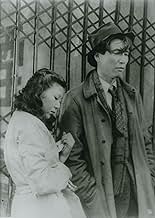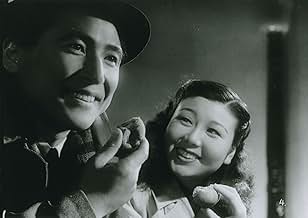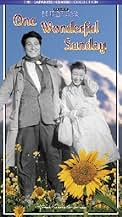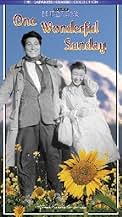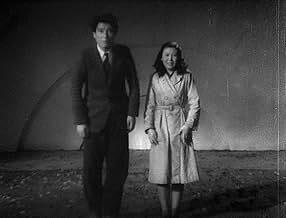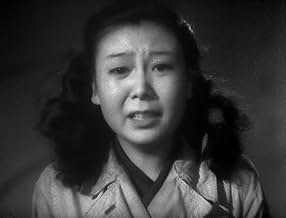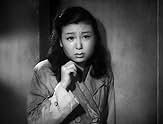IMDb रेटिंग
7.2/10
4 हज़ार
आपकी रेटिंग
अपनी भाषा में प्लॉट जोड़ेंDuring a Sunday trip into war-ravaged Tokyo, despairing Yuzo and optimistic Masako look for work and lodging, as well as affordable entertainments to pass the time.During a Sunday trip into war-ravaged Tokyo, despairing Yuzo and optimistic Masako look for work and lodging, as well as affordable entertainments to pass the time.During a Sunday trip into war-ravaged Tokyo, despairing Yuzo and optimistic Masako look for work and lodging, as well as affordable entertainments to pass the time.
- निर्देशक
- लेखक
- स्टार
- पुरस्कार
- कुल 2 जीत
Sachio Sakai
- Shady Ticket Man
- (बिना क्रेडिट के)
फ़ीचर्ड समीक्षाएं
ONE WONDERFUL SUNDAY (1947) has a simple little plot. A young Tokyo couple have almost no money to spend on their only day available for a date. It isn't long until the money is gone, as well as the young man's spirit. The ending is uncomfortably corny, you will squirm in your seat. There is signs of Akira Kurosawa becoming a great director. He makes us pay attention to the decreasing amount of money (much like he made us pay attention to the number of slain bandits in SEVEN SAMURAI, and his stab at Frank Capra style humor is pretty good. A must see for the student of this great director.
Far from being one of Kurosawa's best films, it is still a powerful and thoughtful one. He had already developed his filmmaking mastery at this point of time, and it can surely be seen by the way some of the scenes are made.
The film concerns a story of love surrounded by poverty and despair; the main characters of the film have the whole Sunday to go out and be together, the only problem being their shortness of money, as they only had 35 yens to go through the day. Being short of money as they were, there were not many things they could do, so they had to spend them wisely. This mainly leads to frustration from both sides, and so the film becomes depressing most of the time, even though they are really in love with each other and are happy to have a day available for them. Throughout the film they will encounter many obstacles and disheartening experiences, which will push them towards feeling impotent, but they always manage to bring happiness out of all that awful moments, and there is where the magic of this film resides.
It might seem like a simple, clichéd love story we have always been familiar with, and it actually could have just been that, if it was not for the Excellency of Kurosawa's filmmaking skills. He brings magic to many of the main scenes of the film, which definitely increases the experience by showcasing everything in detail. The last scene is really outstanding because of the way it is portrayed; you can actually feel both the pain and happiness they are feeling.
In conclusion, this film is definitely overshadowed by other masterpieces from Kurosawa's filmography, and is definitely not the best from him, but this little film is not to be skipped if you really like the director.
My score: 7.7/10
The film concerns a story of love surrounded by poverty and despair; the main characters of the film have the whole Sunday to go out and be together, the only problem being their shortness of money, as they only had 35 yens to go through the day. Being short of money as they were, there were not many things they could do, so they had to spend them wisely. This mainly leads to frustration from both sides, and so the film becomes depressing most of the time, even though they are really in love with each other and are happy to have a day available for them. Throughout the film they will encounter many obstacles and disheartening experiences, which will push them towards feeling impotent, but they always manage to bring happiness out of all that awful moments, and there is where the magic of this film resides.
It might seem like a simple, clichéd love story we have always been familiar with, and it actually could have just been that, if it was not for the Excellency of Kurosawa's filmmaking skills. He brings magic to many of the main scenes of the film, which definitely increases the experience by showcasing everything in detail. The last scene is really outstanding because of the way it is portrayed; you can actually feel both the pain and happiness they are feeling.
In conclusion, this film is definitely overshadowed by other masterpieces from Kurosawa's filmography, and is definitely not the best from him, but this little film is not to be skipped if you really like the director.
My score: 7.7/10
I had said two weeks ago, in a review of Scandal, that Eclipse's new Kurosawa box set could just as easily be called Lesser Kurosawa. That's not fair. I know there are those who champion The Idiot and No Regrets for Our Youth, and even the one film I had previously seen from the set, I Live in Fear, is quite good (though it's hard to argue with it being a lesser film is such an outstanding oeuvre). The truth was, I was hoping very much to find some lesser-known Kurosawa classics. Which brings us to One Wonderful Sunday. Judging solely by IMDb's votes, it's Kurosawa's third least seen movie. And it ranks #26 out of 30 when listed by ratings. Well, I'll be happy to act like I was the first who discovered this hidden gem in Kurosawa's catalogue. This really is a wonderful little film. Influenced very much by Vittorio de Sica, one of Kurosawa's favorite directors, One Wonderful Sunday follows two young lovers, Yuzo and Masako (Isao Numasaki and Chieko Nakakita), spending the titular day together with nothing but ¥35 between them. The two experience sadness and hardship as they go about their date. The structure is episodic, as the lovers experience odd vignettes, meeting various post-war types, like bums and orphans and ticket scalpers. The two try to be happy with each other's company, but Yuzo's poverty makes him feel like less of a man. In one of the strongest sequences in Kurosawa's career, Yuzo decides to act like a cad to drive Masako away. Kurosawa was hardly ever the subtle type, and he is not known for long periods of silence or long takes. This sequence demonstrates a different side of the director. The climax of the film involves an odd breaking of the fourth wall resembling the device in J.M. Barrie's Peter Pan. As far as I know, this is the only time Kurosawa ever attempted such a thing. That wouldn't be too surprising, though, as film audiences rarely interact with characters on screen. It's just too out there for the medium. But God bless Kurosawa for trying it. It's kind of schmaltzy, but I loved the characters so much that at least I thought about clapping for them. A forgotten near-masterpiece.
This simple movie of a young, poor couple trying to enjoy their day off with little money is the best non-Italian neorealist film I've come across. True to the neorealist spirit, not a lot goes on; a gloomy Gus and his girlfriend wander the city, she trying to bring him out of his depression while it seems all of life is determined to keep him in it.
The movie does a good job of painting a picture of Japanese post-war poverty. Chieko Nakakita gives a wonderful, charming performance as she tries to cheer her beau and to fight against her own distress at their plight. Some scenes are truly striking, notably a trip through an uptown club and a tense, almost wordless scene between the two lovers.
The final big scene in the film drifts away from neorealism. It's an odd scene, and from a critical point of view I'm not sure what to make of it, but viscerally I found it rather affecting. I would love to know how audiences responded in Japan at the time.
There are a few issues in the movie. Some scenes go on too long (like the aforementioned "final big scene." And the guy's sudden emotional upswings often seemed to come out of nowhere, unlike his depressions, whose genesis was always clear. But overall it's a very human, simple movie with moments of joy and moments of pain, and I highly recommend it.
The movie does a good job of painting a picture of Japanese post-war poverty. Chieko Nakakita gives a wonderful, charming performance as she tries to cheer her beau and to fight against her own distress at their plight. Some scenes are truly striking, notably a trip through an uptown club and a tense, almost wordless scene between the two lovers.
The final big scene in the film drifts away from neorealism. It's an odd scene, and from a critical point of view I'm not sure what to make of it, but viscerally I found it rather affecting. I would love to know how audiences responded in Japan at the time.
There are a few issues in the movie. Some scenes go on too long (like the aforementioned "final big scene." And the guy's sudden emotional upswings often seemed to come out of nowhere, unlike his depressions, whose genesis was always clear. But overall it's a very human, simple movie with moments of joy and moments of pain, and I highly recommend it.
I loved this film for all the reasons already advanced on this board. A story about two lovers who have only each other in a devastated, corrupted, and occupied society is universal in every sense.
I think Kurosawa's postwar films are especially interesting from a political point of view. All of his films had to pass U.S. censors, and so his political comments are shrouded in symbolism and cinematic sleight of hand. American occupation authorities doubtlessly viewed this film as a simple tale of struggling lovers. But a closer look reveals much more.
"Yuzo" is a war veteran down on his luck. Millions of Japanese war veterans returned home to a society ashamed of their service and anxious to forget their failure. "Masako" is his lover but their future together is rendered difficult by their mutual poverty.
Kurosawa gives us glimpses of pathetic war orphans, destitute women forced into prostitution, and a new economic oligarchy made wealthy by black markets. The ruins of Tokyo are presented only on distant horizons or as incidental background, but the damage inflicted by the 20th U.S. Air Force is clearly implied. None of these elements would ever pass U.S. censorship had they been essential to the story.
Postwar Japanese audiences. however, doubtlessly recognized these subtle references to their occupied and devastated country. That Kurosawa could express these matters without provoking American censorship is itself a testament to his artistic skills.
I think Kurosawa's postwar films are especially interesting from a political point of view. All of his films had to pass U.S. censors, and so his political comments are shrouded in symbolism and cinematic sleight of hand. American occupation authorities doubtlessly viewed this film as a simple tale of struggling lovers. But a closer look reveals much more.
"Yuzo" is a war veteran down on his luck. Millions of Japanese war veterans returned home to a society ashamed of their service and anxious to forget their failure. "Masako" is his lover but their future together is rendered difficult by their mutual poverty.
Kurosawa gives us glimpses of pathetic war orphans, destitute women forced into prostitution, and a new economic oligarchy made wealthy by black markets. The ruins of Tokyo are presented only on distant horizons or as incidental background, but the damage inflicted by the 20th U.S. Air Force is clearly implied. None of these elements would ever pass U.S. censorship had they been essential to the story.
Postwar Japanese audiences. however, doubtlessly recognized these subtle references to their occupied and devastated country. That Kurosawa could express these matters without provoking American censorship is itself a testament to his artistic skills.
क्या आपको पता है
- ट्रिवियाThe film's climax was considered a failure in both Japan and the U.S. as audiences refused to clap for the lead characters, though supposedly it went over very well in France, gaining much audience participation.
- गूफ़A clock is seen above a shop in the baseball scene. The time showing is 5:05, but it is still only morning.
- साउंडट्रैकLa Cumparsita
Composed by Gerardo Matos Rodríguez
टॉप पसंद
रेटिंग देने के लिए साइन-इन करें और वैयक्तिकृत सुझावों के लिए वॉचलिस्ट करें
- How long is One Wonderful Sunday?Alexa द्वारा संचालित
विवरण
- रिलीज़ की तारीख़
- कंट्री ऑफ़ ओरिजिन
- भाषा
- इस रूप में भी जाना जाता है
- One Wonderful Sunday
- फ़िल्माने की जगहें
- Toho Studios, टोक्यो, जापान(Studio)
- उत्पादन कंपनी
- IMDbPro पर और कंपनी क्रेडिट देखें
- चलने की अवधि1 घंटा 48 मिनट
- रंग
- ध्वनि मिश्रण
- पक्ष अनुपात
- 1.37 : 1
इस पेज में योगदान दें
किसी बदलाव का सुझाव दें या अनुपलब्ध कॉन्टेंट जोड़ें


